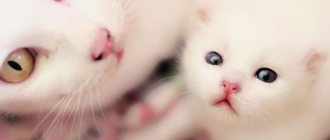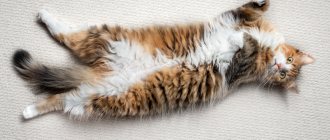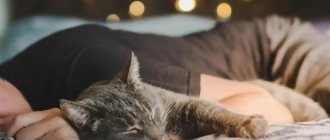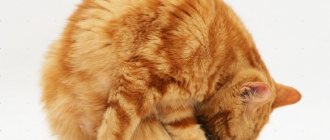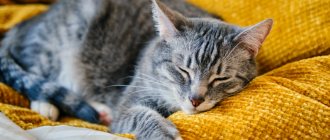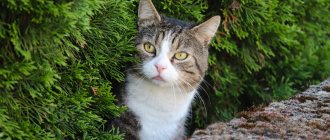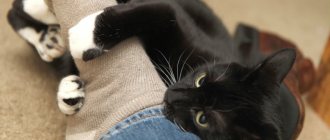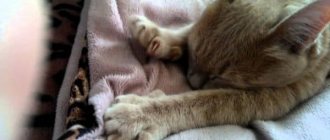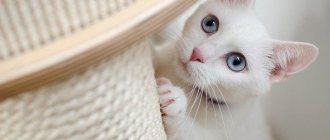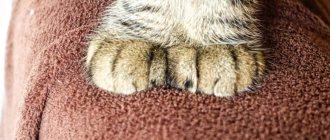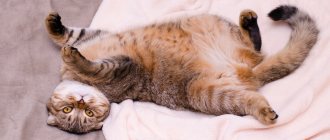Yawning is a common involuntary behavior. Scientists have not yet figured out the exact reason why cats yawn, despite how common it is. Some theories as to why your cat yawns when he sees you are worth considering.
The cat will yawn when it sees you because it feels content and comfortable. This is a way to show that your pet is completely relaxed in your presence. Yawning is your cat's way of getting more oxygen and waking up as she wants to regain her energy and is ready to spend time with you. Of course, some cats just want to sleep.
Some experts suggest that cats yawn as a unique form of communication. Yawning works like body language to get your attention, except for actual meowing. In most situations, an occasional yawn means that the cat is relaxed.
Causes of yawning in cats
Cats yawn for a variety of reasons. Some of them are safe and natural, others require attention from the owner and solution to the problem. Oxygen deficiency is the main cause of yawning in cats, which can be caused by various factors. Which ones?
- Awakening.
During sleep, the animal's brain activity slows down, as does the blood flow, and accordingly, carbon dioxide accumulates in the blood. To restore brain activity after sleep, you need to enrich the bloodstream with oxygen, and nothing can do this faster than yawning.
- Physical activity.
Any active action, especially hunting for prey, depends on good oxygen saturation of the brain and the work of the heart at the time of running and attacking. To activate the process, the cat may yawn before jumping. But a long-term lack of sufficient mobility causes oxygen starvation and yawning in cats.
- Overwork
.
Fatigue is a natural process of any living creature. In order not to instantly fall asleep when very tired, the cat yawns, thus supporting the body’s functioning. Tired animals are characterized by a decrease in brain activity; accordingly, yawning will occur purely as a reflex.
- After meal
.
A delicious lunch requires some energy to break down foods and distribute nutrients and beneficial substances throughout the body to organs and tissues. Accordingly, the blood flow sends it not only to the brain, but also to the digestive system. The denser, more satisfying and high-calorie food is, the more energy will be required to absorb it. That is why preference is given to easily digestible foods, after which cats not only feel better, but also yawn less.
- Imitative reflex.
This phenomenon usually works in people: when one person yawns, the second has a similar desire. Sometimes this behavior is also typical for animals, and the cat yawns while looking at the owner who yawned a moment earlier.
- Stressful state
.
Inside a cat’s body, under stress, hormones, adrenaline and other substances are released into the blood, which, in turn, affects brain activity. Accordingly, by yawning, the cat reflexively tries to clear the bloodstream of decay products and improve brain function. As a rule, this phenomenon is observed during transportation of the animal or when visiting a veterinary clinic.
- Discomfort in the oral cavity.
Toothache, inflammation of the gums, wounds, a foreign object stuck in the mouth - all this can cause frequent yawning in a cat. At the same time, the animal begins to drool profusely and constantly touch its mouth with its paw.
- Changes in atmospheric pressure.
They affect not only people, but also pets. Cats suffer from low or high blood pressure, headaches, decreased appetite, and sometimes vomiting.
- Neurological disorders
.
Yawning is one of the symptoms of some neurological diseases. However, other signs associated with changes in the animal’s behavior also appear. Depending on the illness, the cat's head may tremble, he may grind his teeth, swallow frequently, or the owner may notice a loss of coordination of movements. As a rule, such yawns differ from ordinary ones in that they are more frequent, short and convulsive.
In the evening, cats yawn not because they are tired and want to sleep, as many owners think. They are preparing for their next activity - nocturnal, characteristic of most predators, which include the cat family in their natural habitat.
Why and how cats purr: we understand the usual “business” for cats
We yawn when we wake up in the morning and fall asleep in the evening. We yawn during boring meetings and during long pauses. We yawn as soon as someone nearby yawns. It would seem that such a habitual reflex, or a ritual. But it’s surprising: researchers are still confused about the reasons for its appearance.
What is yawning?
Yawning is a breathing process that occurs involuntarily with a long, deep inhalation and a relatively quick exhalation. The mouth, as a rule, is wide open and this breathing action is accompanied by a peculiar sound, and for some, tears also appear reflexively.
The process of yawning is in most cases a normal physiological phenomenon that appears when there is a lack of oxygen, stressful situations, overwork, but it can be a sign of certain diseases in the body.
Causes
The most common version is that yawning is a protective mechanism that allows the brain to relieve fatigue by invigorating itself with a fresh dose of oxygen, and at the same time getting rid of excess carbon dioxide.
Statistics and research support this hypothesis: people are most likely to yawn at times when their gray matter is tired and clearly in need of rest - for example, in the evening after a hard day at work, during a boring meeting, or during an overly complex lecture.
A yawn is essentially the same as inhaling, allowing the lungs and blood to become saturated with oxygen. However, as it turned out, people yawn even if they are given pure oxygen for breathing - that is, the reflex opening of the mouth is in no way associated with hypoxia (lack of oxygen). With what then?
Our gray matter works on a similar principle: with prolonged or intense work, its temperature rises, which impairs connections between neurons and ultimately has a destructive effect on thinking.
Therefore, the brain needs cooling - this can be facilitated by an open window or a walk in the park, a glass of cool water, or (since neither the walk nor the glass is shining) a sweet yawn.
In principle, the cooling theory is confirmed by experiments. For example, volunteers who had an ice compress applied to their forehead while watching boring movies yawned 2 times less often than a group of volunteers without a cooling compress. So, if you feel like you're gaping, be sure to note: Your brain is overheated and would benefit from a walk in the fresh air.
This cannot be explained either by oxygen starvation or overheating of the brain, because everyone’s physiological processes occur individually, which means they cannot be simultaneous. This means that the reflex has some other meaning. And he was actually discovered after stumbling upon another fact.
Yawning in people begins not only with visual contact with someone yawning nearby: often, to start the process, you just need to think about yawning, read about it, or hear the specific sound of yawning. It follows from this that a reflex is not always a physiological process, but also a mental one.
After conducting research, scientists came to the conclusion that yawning is contagious due to mirror neurons.
These neurons are responsible for the ability to imitate (for example, when learning foreign languages) and empathize. They force us to consciously experience the emotions of other people, which is actually called empathy.
Roughly speaking: You yawn means you have empathy and are able to function in social groups. It is assumed that our ancient ancestors in this way determined “their own” - those with whom we could play in a team.
By the way, as experiments show, children under 4 years of age and those who suffer from autism are not subject to mirror yawning: they have not yet learned to act according to social laws.
However, interesting facts about yawning are not limited to this.
Interesting Facts
Yawning can be “infected” both from person to person and from person to dog. Research by Swedish scientists proves that dogs can yawn when yawning people come into their field of vision, and the older the dog, the more prone it is to reflexive imitation, and yawning is not transmitted to puppies less than 7 months of age.
If we talk about spontaneous, non-imitative yawning, then different animals have their own reasons for it. The same dogs often “reflect” when they are nervous - for example, when they find themselves in an unusual environment.
While waiting for lunch at the zoo, the lions begin to yawn intensely. Hyenas - when preparing to attack a victim. Many monkeys, by opening their mouths wide, show their superiority in a pack of relatives.
But herbivores yawn much less often than cold-blooded and carnivorous animals. For example, it is extremely rare to see a horse, cow, camel or hare yawning. This, by the way, leads scientists to the idea that yawning may be somehow connected with the level of intellectual development: those creatures whose IQ is higher yawn more often than “silly ones.”
What could frequent yawning be a sign of?
Frequent yawning in itself cannot be a sign of any disease. Its appearance can be triggered by lack of sleep, fatigue, stress, nervousness, overeating, and boredom. In this case, this is a normal reaction of the body to such factors. Once they are removed, yawning will return to normal. By the way, a person yawns at least 10 times during the day.
The presence of other symptoms with frequent yawning may be a sign of illness. For example, with constant drowsiness and frequent yawning, a possible diagnosis is vegetative-vascular dystonia or cardiac arrhythmia.
Dizziness with blurred vision, increased body temperature along with frequent yawning may be a harbinger of an epileptic seizure.
How to overcome yawning?
There are situations when yawning is inappropriate. There are several ways to deal with it:
- When the next yawn approaches, you need to take a deep breath through your mouth and exhale through your nose.
- Many people find that taking a sip of water or wetting their lips with it helps.
- Adequate sleep prevents frequent yawning.
- Exercising will keep the body alert, saturating it with oxygen. You can do squats, push-ups or other physical exercises to tone your body.
- Proper nutrition and drinking the required amount of water throughout the day prevents frequent yawning.
- Don't slouch. Smooth posture contributes to the full filling of the lungs with oxygen. When your back is bent, the diaphragm is not completely saturated with air, which can cause increased yawning.
- Walking in the fresh air, ventilating the room, and quitting smoking will help get rid of causeless yawning.
When a cat yawns: what are the reasons for this phenomenon?
1) After sleep. When a cat sleeps, brain activity slows down. Blood flow slows down, brain activity slows down, and carbon dioxide accumulates in the blood. Accordingly, upon waking up, it is necessary to establish brain activity, so nature provided for yawning - a quick enrichment of the bloodstream with oxygen.
2) During times of stress. Stress leads to the release of harmful substances into the blood, which leads to a decrease in brain activity. Accordingly, to remove these substances, it is necessary to yawn tightly and, so to speak, relieve tension. You can observe a picture when a pet yawns due to stress, for example, in a veterinary clinic, when the four-legged dog is waiting in line with the owner to see a specialist.
3) After eating. To break down foods, part of the energy in the bloodstream is sent not to the brain, but to the digestive system, in order to ensure the breakdown of recently eaten food. The number of yawns at this moment increases in order to maintain brain activity at the desired level. It is worth noting that heavier cat foods that are poorly digestible cause more frequent yawning than easily digestible ones.
4) As a consequence of overwork. After a long trip somewhere in a carrier, your pet may simply get tired. Brain activity will be reduced. To restore it, the cat yawns reflexively.
5) Due to some neuralgic disease. If blood flow is disrupted and harmful elements are removed from the animal’s body, in particular the brain, the pet may yawn regularly. And if other symptoms or behavioral characteristics are observed, you can safely go to the veterinarian and look for the cause of the disease.
How to get rid of yawning, recommendations
To stop your pet from yawning you need to:
1) Allow the animal to get enough sleep, that is, organize a daily routine.
2) Provide physical activity, namely, play more. The latter is easily achievable if you use special toys for cats , which allow you to use all muscle groups in the body of the mustachioed tabby.
3 Balance your diet. Food should be easily digestible
4) Try to reduce the number of stressful situations. If such problems occur, use special herbal preparations to relieve tension, fear, stress, allowing the four-legged animal to relax.
5) Be regularly examined by a veterinary specialist; in case of illness, carry out treatment measures in a timely manner.
And the cat brethren even yawn very often. However, such behavior, contrary to popular belief, is not necessarily a sign of laziness! Why do cats just sit and yawn? In what situations does this happen and what could it mean? The fact is that there is not a single specific answer to this question. There is too much theory on this topic.
Information to get started; It’s not surprising, but not only all mammals, but also… birds and even fish just sit and yawn! It turns out that this reflex occurs in many animal species, which leads to the conclusion that yawning itself may not be a useless phenomenon - after all, nature knows what it is doing! See if any of the explanations below apply to your pet.
Yawning the cat wakes up to life.
Classic. It's hard to find a simpler explanation. Cats just sit and yawn after sleeping for several hours when they first wake up or try to wake up. What's interesting is that our pussies, unlike humans, don't just sit and yawn when they wake up. They, as a rule, squint their eyes, arch their whole body and stretch out their front legs, while their back legs, on the contrary, tuck in, as in the photo. At the same time, when yawning, they widely show their throat and teeth.
By yawning, a cat relieves stress.
This explanation applies in principle to both cats and dogs. In stressful situations (for example, when another animal appears in the field of view, or when the pet simply feels threatened from the outside), the easiest way to relieve anxiety is to yawn. There is another reason: the furry one simply doesn’t want to show fear. This is a signal to a potential enemy - I’m not afraid of you, but I don’t want to fight with you either.
The cat yawns when he feels stuffy.
Just like us! This is scientifically proven. A cat who yawns when he feels stuffy. A good yawn is the best way to bring air into the body. Who among us, after being in a stuffy room for too long, does not have the same reflex?
A cat yawns when it doesn't know what to do.
Again, this is typical for cats and dogs. When a pet doesn’t know what to do in a certain situation. Apparently a yawn, which causes a strong flow of air, stimulates the body, and it is easier for the animal to make a decision. Some argue that in such situations the little sneak gets precious seconds to think - what to do here? Probably, more than once you called your pet to your place, and instead of immediately going to you, he sat down halfway, looked at you and yawned. Apparently he was wondering whether it was worth approaching the owner who was calling him, what benefits would he get from this?
A cat yawns when she is bored.
Is not a fact. Although some argue that a yawn is a sign of boredom in a cat and then try to provide the pet with entertainment in the form of a fishing rod or mouse. Others believe that through yawning a pet shows, rather, that he is calm and calm, and not that he is bored. It's difficult to get a definite answer here. It is best to test this assumption on your own pet. If he yawns widely, but has not just woken up, and there is no danger in the surrounding area, just try to play with him. Does he not move or react? Well, probably, but this is just relaxation, not boredom.
Natural and forced yawning - how to distinguish?
You need to understand that even if a cat yawns often, it does not control this process. Yawning is an involuntary action that is almost impossible to suppress. Such a strong reflex is due to the fact that a yawn provides oxygen to the brain - the most important, one might say, governing organ of the body.
Note! The reasons for yawning are always low blood oxygen saturation. Your task is to determine whether oxygen deficiency is a symptom of illness.
Natural causes of yawning:
- After waking up - we discussed this case above, while the cat is sleeping, its organs are not working at full capacity, and a yawn makes it possible to mobilize the body. By the way, during a yawn and a sharp enrichment of the blood with oxygen, the same active displacement of carbon dioxide from the blood occurs. This process leads to increased brain activity and speed.
- In a stressful situation, adrenaline, other hormones and substances enter the cat’s blood, leading to increased activity of the brain and the whole body. Yawning compensates for oxygen costs and helps the blood quickly clear itself of decay products, substances “thrown” into the blood. Stressed yawning can be accurately detected when a cat is in an unusual environment - in a car or a veterinary clinic.
- Immediately after eating - for most of the day, the main volume of oxygen is distributed evenly throughout all organs, but after eating, the digestive system is activated. Food enters the stomach, is partially processed by acids and passes into the intestines. Through the mucous membranes of the intestines, beneficial substances are absorbed into the blood and distributed throughout the body. To increase blood flow and speed up the feeling of satiety, the cat instinctively yawns. In addition, yawning helps maintain a comfortable level of oxygen in the blood for the brain.
- After physical activity , all living beings can get tired; yawning helps maintain a normal level of vital activity. If a cat could not yawn, tired, it would immediately go to bed (as most apartment pets do), but when this is not possible, reflexive yawning maintains the functioning of the body.
Physiology and psychology of cats - features
How do you feel if you yawn in a crowded place? Some people don’t care, what’s the big deal, some are embarrassed, but cats feel superior. Yes, by yawning and confident gait, four-legged animals demonstrate who is in charge in the territory , showing their strength and readiness to use it.
If you've watched films about wildlife, you've probably seen a lion basking in the sun, contemplating the pride and yawning widely. Perhaps it’s a matter of falling drowsiness, but more often than not, the behavior of the king of beasts indicates to his subordinates their status.
Note! When a cat yawns, it shows off its teeth and muscle mass.
Many people who observe their feelings confirm that after yawning, consciousness clears, the quality of well-being improves, there is a feeling of lightness and a decrease in stress levels. Yawning is especially important in a stressful situation, when the body works hard, a person yawns without even noticing it.
And it happens that after a serious quarrel or conflict, one of the participants begins to feel sleepy, a depressed state sets in, and appetite disappears - all these are the consequences of oxygen starvation. The body had a hard time because it lacked oxygen, and the person, “spurred on” by adrenaline, screamed (actively consumed oxygen) and did not yawn.
In a dream, the cat’s body is at rest, the immune system is working at full strength, but all organs are “resting.” Against the background of relaxation, blood flow in the animal’s body weakens and the oxygen content in the blood decreases. After waking up, the cat yawns and stretches to quickly get into shape and saturate its body with oxygen . The cat performs similar actions reflexively every time an oxygen deficiency is created.
This is interesting! The process of yawning is inherent in all living beings, even fish.
When a cat yawns, he is preparing for physical activity. Most cats hunt by waiting for prey and making a dash, and the games of four-legged animals are always somewhat reminiscent of hunting. During a jerk, the duration and speed of running depends only on the animal’s heart muscle; more precisely, a cat will not be able to run faster or longer if the heart does not provide the brain with oxygen. Yawning before the jerk, the tailed one seems to feed the blood with oxygen for its rapid, sharp and voluminous consumption.
Note! During stretching and yawning, the muscles are actively saturated with oxygen.
Yawning in the evening, according to the owner, indicates that the cat wants to sleep, but often this cliché is not true. All cats, even those born and raised in an apartment, are active at night and quieter during the day - this is an instinct. Even if your pet has adjusted to your rhythm of life, he will yawn in the evening and most often not in anticipation of sleep, but to warm up before any activity.
Some owners are perplexed how it turns out that during the day their cats are very calm, and in the evening they begin to run along the walls - this is the very instinct of night activity, it is absolutely natural and needs to be tolerated.
How often does a cat yawn?
- The average cat yawns once every hour.
- Definitely after sleep and stretching.
- When this happens much more often, it is worth carefully examining the cat.
If your cat yawns at the sight of you, it is most likely showing happiness in your presence. The cat is relieved to feel at home and communicates that he feels safe with you. However, keep an eye on your cat's behavior. Any behavior that deviates from the norm should attract our attention. If your cat spends more time yawning than she should, have her checked by a veterinarian.
See also: Why do cats sleep a lot?
Discomfort
There is a chance that your cat is yawning due to some kind of discomfort. Some cats yawn if they experience pain, especially in the mouth. This could be anything from a toothache to a sore mouth.
If you notice that your cat is drooling excessively and yawning a lot, it's time to visit your veterinarian. It is very likely that something is wrong with them and needs to be sorted out.
You should also pay attention if your cat seems to be pawing at the mouth. This could very well mean that they are in pain for some reason. In this case, the cat may attack if you try to touch its mouth. These are all signs that something is wrong with them.
© shutterstock
What happens when a cat yawns?
Yawning in a cat is an uncontrolled respiratory process of the body, consisting of a deep, slow inhalation and a quick, sharp exhalation. The result of the process is the enrichment of blood with oxygen and an increase in the rate of vascular blood exchange in the brain. And this leads to the enrichment of brain cells with nutrients coming from the bloodstream and cleansing them of carbon dioxide and harmful substances. Consciousness becomes clearer, well-being improves, some lightness appears in the body, and stress is relieved.
Psychological and physiological reasons
Yawning for cats is an uncontrollable process during which a deep breath is taken and a quick exhalation is made. Hyperventilation increases oxygen levels in the body and stimulates brain function. Normally, blood enrichment is necessary for a number of reasons:
- "Loading the body." Immediately after waking up, immediate activation of all processes in the body that were significantly slowed down during sleep is required. A deep yawn allows you to quickly raise the level of oxygen in your blood and get rid of excess carbon dioxide.
- Tactical move. A seemingly strange phenomenon can be observed during a hunt. Despite all their concentration, the cats suddenly begin to yawn. This occurs to sharply raise the level of oxygen in the blood before the subsequent burst.
- Ready for night adventures. In the evening, cats yawn not because of drowsiness, but to additionally conserve energy. Therefore, yawning is just preparation for night activities.
Also, by yawning, animals demonstrate their superiority and dominant role in the occupied territory. This is how most representatives of the cat family behave.
Why do cats purr?
Purring is a rhythmic sound made by a cat. It can be continuous and/or vibrating. Pets purr on different occasions. Most often this happens at the moment of receiving positive emotions, when they are in a good mood or as a sign of gratitude (for example, for food or affection). The reason for purring may also be related to the pet’s character.
People are accustomed to the fact that cats purr, but wild representatives of the cat family - tigers, pumas, leopards, cheetahs, jaguars - can also do this.
In fact, the reason for purring is not entirely clear. Scientists have not yet reached a consensus on this issue. Sometimes animals purr when left alone, when they feel safe or when they are eating. The female can purr during childbirth, and the kittens can purr already on the second day after birth.
There is also a theory that this happens for the purpose of self-medication: while the animal’s brain is purring, it produces a special hormone that has a healing and relaxing effect, which is why some cats purr when they are in pain (wounded cats).
Scientists have found that the nature of these sounds depends on the cause - purring can be grateful, calm, impatient, etc.
An adult cat may purr when interacting with kittens - this indicates that she is happy, calm and takes care of her offspring with pleasure. In addition, the animal may purr if it asks for something, for example, to open a window or door, of course, hoping that this request will be granted. The reason for purring can be anything. Just as a person cries and laughs out of happiness or fear, so a cat expresses different emotions when it purrs.
Purring and rumbling
Until the 20th century, felines were unofficially divided into purring, growling, etc. The difference in timbre and character of sound depends on the structure of the hyoid bone (it is structured differently in all species). The conditional division took place in groups. For example, tigers, lions, etc. were classified as roarers. But later it became clear that there were too many exceptions in each group (for example, snow leopards purr), and such a division was abandoned.
Snow leopards, despite their menacing nature, can purr
Cat growling can be caused by aggression or fear. Cats growl more often - cats do not have to defend their territory so fiercely. And since the growl of a domestic cat is difficult to compare with the roar (of a lion, for example), these sounds can be called rumbling.
Video: how a cat growls
How an animal makes purring sounds
Scientists have not discovered a separate organ responsible for purring in cats, so the method of producing these sounds has long remained controversial. The following is now known: electrical impulses arise in the cerebral cortex, are sent to the vocal cords, the muscles located next to them tense, causing the hyoid bones to vibrate and sound is produced. Even though a cat's purr comes from the nose and mouth, it vibrates the entire body.
The frequency of purring depends on the circumstances (from 50 to 150 hertz). The tone and volume of the sound also differs in different cases. A satisfied cat purrs more quietly and tenderly.
Diagnostics
Determining the exact reason why a symptom occurs is not easy, so it is important to pay attention to other signs.
With a complaint of frequent yawning, they contact a therapist, who conducts an examination and, if necessary, sends the patient for tests (biochemistry of blood and urine, ultrasound of organs, testing for tumor markers - depending on the situation). Based on the results obtained, the doctor will be able to make a more accurate diagnosis and refer you to a highly specialized specialist for further treatment.
If you suspect that frequent yawning is psychogenic in nature, you should consult a psychotherapist. Here the study will be based on a conversation with a doctor and performing psychological tests. Additional tests may be required to make a more accurate diagnosis.
What happens during a veterinary examination?
The veterinarian will start with a physical examination and palpation (palpation), and sometimes this is enough. If there are any questions about the presence of foreign objects, you will be advised to undergo additional examination: an x-ray or a blood test.
If complications develop or there is concern that the cat is unlikely to cope on its own, the veterinarian may need to perform an endoscopy, which is a non-surgical procedure to examine the digestive tract (under anesthesia), or surgery. During endoscopy, a foreign body is examined in real time and future tactics are determined. Typically this happens before surgery.
Recovery from endoscopy is usually fairly quick. The cat will most likely go home the same day. But sometimes she is left under observation overnight.
Other pathological causes
Yawning is always a lack of oxygen in the animal’s body. The cat owner should be alert to the accompanying symptoms, since yawning may be a sign of more serious abnormalities:
- changes in atmospheric pressure - can provoke headaches in the animal, an increase or decrease in blood pressure, and a lack of interest in food;
- neurological diseases - disrupt the supply to the brain, so by yawning, the cat strives to improve its well-being.
For the normal condition of the animal, it is recommended, as in humans, to make scheduled visits to the veterinarian for a preventive examination and additional manipulations in the event of suspicious symptoms.
Yawning itself is an absolutely natural, physiological process of the body. The nature of yawning is explained very simply: oxygen starvation. When yawning, a large volume of air is inhaled, which means that the blood is more fully saturated with oxygen. But this is in humans. What about yawning in animals, in particular in cats?
Forced reasons
Yawning is always a lack of oxygen. The owner should be alerted by the pet's frequent yawning, state of apathy, lethargy. After all, yawning can be a sign of illness :
- changes in atmospheric pressure can cause high or low blood pressure in a cat, cause headaches, vomiting, and lack of appetite;
- neurological disorders - neuroses, brain tumors - cause oxygen starvation of the brain and, by yawning, the animal somewhat relieves its well-being.
The consequences of diseases can be very serious, so it is not recommended to independently diagnose your pet and self-medicate.
Source
Cats Yawn: Physiological and Psychological Basis
A yawn in a cat is an uncontrolled breathing process in which a slow, deep inhalation occurs and a rapid exhalation occurs. As a result, the blood is enriched with oxygen and brain function improves. Animal physiology and psychology will help you understand why cats yawn.
© shutterstock
Psychological yawning
A person yawning in a crowded place feels uncomfortable. Cats are the opposite: they yawn demonstratively to show their superiority and dominant position in a given territory. In films about wildlife, you can often see a lion lying in a clearing and yawning sweetly. By this he indicates to others their subordinate status.
In the process of yawning, a cat shows off its teeth and muscles.
Physiological yawning
The physiological basis of the yawning process is related to the need for oxygen to enter the body. So, a cat yawns:
- After waking up from sleep. When a cat sleeps, the whole body rests, processes slow down, including blood flow. Carbon dioxide accumulates. To saturate the brain and organs with oxygen, the cat yawns and stretches. As a result, the body's functioning returns to normal.
- In preparation for physical activity. Cats, like many predators, lie low, wait for prey, and then make a quick dash. The running speed of an animal directly depends on the work of the heart and the quality of oxygen saturation of the brain. Therefore, before making a jump, the animal yawns, feeding on oxygen, so that it can then quickly be used up.
- In the evenings. A cat's yawning in the evening does not mean that she wants to sleep. Cats are nocturnal predators. They sleep during the day and hunt at night. And the yawning of a cat is preparation for night life, for active actions.
Your cat imitates you
There is a known phenomenon among people when one person yawns if he sees another doing it. The scientific term for this is “mirror neuron response.” Some researchers believe this could even happen between two different species.
This means that your cat may yawn simply because it notices you yawning. Next time you find yourself yawning in the same room as your kitten, take a quick look to see if they've copied you. It may seem far-fetched, but it's definitely not the strangest theory about cat yawning.
Boredom
Another explanation for a kitten yawning is that it is bored. Cats can get bored and anxious, just like their owners.
If you don't give your cat enough attention or play with him every day, boredom can quickly creep in. Almost all animals breathe deeply when they are stimulated in some way. If your pet doesn't get enough mental and physical stimulation, he may start yawning.
It's important to make sure your fuzzy friend gets the attention he deserves every day. You should take time to play with your cat, especially if it seems like she might be bored.
You may interpret this behavior as your cat trying to tell you that she needs to be entertained and that this is partly your responsibility.
Your cat needs more air
Sometimes cats open their mouths wide and yawn to take deep breaths. This may indicate that your pet is having difficulty breathing.
If you notice that your cat is yawning a lot, it's probably a good idea to take her to the vet as soon as possible. While this may not be dangerous, it's worth being on the safe side just in case.
© shutterstock
Many people yawn when they stretch, which is completely normal. However, this is their way of getting more oxygen. This is usually not something you should worry about unless it is accompanied by some abnormal behavior.
Is yawning a sign of a health problem?
Most cat yawns are a natural part of the body's functioning or an attempt at communication. As with any behavior, if something happens too often and is not adaptive, it may indicate health problems. There are three possible explanations for an excessively yawning cat:
Dental problems. When a cat yawns frequently, it may feel a toothache. Additional symptoms include drooling, bad breath, red gums and feeding problems. Intervention by a feline dentist will be necessary. Shortness of breath. When your cat is breathing at an accelerated rate, panting, making strange sounds while breathing, do not delay your visit to the veterinarian. Hypercapnia. This is a condition in which there is too much carbon dioxide in the body. The still yawning cat is trying to remove the CO2 and replace it with oxygen. You may need urgent treatment.
Causes
Cat breeders have identified several reasons for this behavior:
- It is believed that no matter what age a cat is, it remains a kitten at heart. Being small, the future cat feeds on milk, which it has to obtain through constant pressure on the mammary gland. In adulthood, the cat's caring mother is replaced by a mistress or owner, and therefore the habit of trampling passes on to them. This is how the cat shows that it trusts the person, is under his protection and is grateful for it.
- Since its inception, the cat has developed its main character trait – independence. She provided herself with food and arranged her “life” absolutely independently. And in order for a bed of grass or leaves to be soft in the wild, she had to trample with her paws to level the bed, make it soft and comfortable. The ritual, performed many times, has become an instinct in a cat that has become a pet. Climbing onto the owner's lap, the furry pet purrs, caresses, closes its eyes, and performs all these manipulations unconsciously, instinctively.
- Although it is believed that a cat is attached to the house, and a dog to its owner, a cat will never trample a stranger. And in the family, the animal will choose only one member to whom it will give such a massage. On the paws, between the pads in which the claws are hidden, the cat has sweat glands. With repeated pressure, a special secretion is released from the glands, with which the pet marks “its” owner. Thus, laying claim to it.
- A cat sitting on its lap and quietly snoring demonstrates the highest pleasure and gratitude. It has been noticed that such positive emotions are transmitted to the owner, causing a state of calm and tranquility. The feeling of joy helps to cope with diseases of the heart, nervous system, and blood vessels. At the moment of highest pleasure, the cat begins to purr, its body vibrates, producing a kind of massage. That's why the cat is called a natural healer.
- But such a session is necessary not only for the owner or hostess. This is how cats relieve their stress. After all, these pets, like people, can experience nervous tension, stress, and pain. Trampling with paws becomes the key to happiness and peace, and the endorphin released during this process causes a state of joy and euphoria.
The child yawns often - why?
The baby begins to yawn while still in the mother's womb at about the eleventh or twelfth week of pregnancy. Why do children yawn? One recent American study confirmed that yawning is evidence of the successful and correct development of a baby's lungs. However, at each age, the tasks of yawning are different, and if a yawn often helps adults to cheer up, then a baby, with the help of a yawn, regulates the temperature of the brain, calms down and falls asleep.
But if a child yawns too often and not when it is time for him to rest, it would be a good idea to consult a doctor, since yawning may indicate a lack of oxygen or nervous tension. In the second case, you will need to consult a neurologist, and if the problem is a lack of oxygen, then you will have to reconsider the baby’s regimen in the direction of increasing the duration and frequency of walks in the fresh air.
What can I do to prevent this in the future?
If you are on a personal connection, like at home, you can run an anti-virus scan on your device to make sure it is not infected with malware.
If you are at an office or shared network, you can ask the network administrator to run a scan across the network looking for misconfigured or infected devices.
Another way to prevent getting this page in the future is to use Privacy Pass. You may need to download version 2.0 now from the Chrome Web Store.
Cloudflare Ray ID: 569a5b6edc8bc79d • Your IP: 5.45.65.94 • Performance & security by Cloudflare
As a Norwegian it makes me sad to see all these abandoned farms in Norway because I guess that's what this article is about.
One small note here is that all the pictures shown are about 20 photos of the same house, but from different angles and uncontrolled feeds. In addition, there are buildings presented here that were not intended for habitation at any time, but as barns or outbuildings, as we say, and often with a private workshop included in the outbuildings.
There are also images of what we call main houses or manors, large farms in which many of the countrymen participate as "housewives" - there are simply no such abandoned large estates in Norway. Therefore, the photographs must be taken from another country.
Some of the drawings show a boathouse (boat house) and are presented as an abandoned house. Secondly, there are photographs of houses that do not belong to any Norwegian building customs or structures and which obviously came from other countries.
Everyday Reasons for Frequent Yawning
Cats, like humans and other animals, behave in a similar way and begin to yawn under certain conditions:
- Stuffiness in the room. Increased humidity, temperature and lack of oxygen cause yawning to provide additional air.
- Confusion of the animal. In this state, a good yawn helps you quickly make a decision for further action. Again, this is due to the increase in oxygen concentration in the animal's blood and brain.
- Boredom. Against the background of this state, drowsiness increases, and yawning becomes the expected result of a lack of entertainment.
- The period after eating. For complete digestion, the body redistributes blood, resulting in most of it accumulating in the digestive system. Blood circulation in the brain decreases. Yawning helps compensate for oxygen deficiency.
- Physical fatigue. Yawning in this case means going to bed soon. A long rest will compensate for the loss of strength in the future, and the pet will wake up cheerful and active.
As you can see, yawning is not something inexplicable. All physiological processes in the body have a clear sequence and mechanisms to compensate for the listed conditions.
Owner's actions. In order for the pet to feel good, the owner must follow the recommendations of specialists:
- First of all, you need to let your cat sleep as much as she wants. You cannot intentionally wake a cat, even if it keeps you awake at night. There are more humane ways to solve this problem.
- During the daytime, you should pay more attention to your pet and play active games with it. This will not only allow the animal to release all excess energy, but will also strengthen the bond with the owner.
Whatever the innate instincts and habits of the mustachioed tabby, exercise during the day will ensure healthy and sound sleep at night.
Reasons why a cat yawns
The reasons why a cat yawns can be very diverse. But they are caused either by physiological reasons or psychological.
Natural causes
Natural causes of yawning in cats include all physiological and behavioral processes that require rapid enrichment of the body with oxygen.
After waking up
During sleep, your cat's metabolism slows down. The work of all organs proceeds in an energy-saving mode. The animal's body is relaxed. Oxygen consumption is reduced. When an animal awakens, it must quickly prepare itself. Dispel the fogginess of perception, put the muscles in order, because relaxation is the first enemy of any animal, as it threatens trouble. Stretching and yawning help a cat quickly restore the functioning of all parts of the brain and the body as a whole. Stretching warms up stiff muscles, increases blood circulation, and yawning provides an influx of oxygen.
By yawning, a cat supplies the body with a large portion of oxygen, and stretching stimulates blood circulation in the muscles.
Before physical activity
Yawning before physical activity replaces the cat's warm-up. If a person warms up his muscles with a set of exercises, then a cat prepares itself by yawning.
Before going to bed
Everyone yawns before going to bed. Drowsiness occurs only when the entire body requires recharging in the form of sleep. Having exhausted all energy reserves, it must be restored by shutting down. But during sleep, all processes slow down very much, so by yawning the body increases the amount of oxygen that will be required to maintain the functioning of all systems. This process is identical for all living beings.
Yawning before bed will provide the body with an influx of oxygen, which is required for the operation of all systems while the cat sleeps
Stress
During stress, there is a sharp release of adrenaline into the blood, contraction of blood vessels throughout the body, and increased heart rate. Stress is caused by fear, aggression, pain. This process is also the same throughout the animal world. The breakdown products of chemicals entering the blood can cause intoxication of the body. In this case, yawning is a great help. By saturating the blood with oxygen, it helps rid the body of harmful impurities and improve the functioning of all sensory organs: vision, hearing, smell and touch. Stressed yawning is easily distinguishable, as it occurs against the background of unusual situations for the cat (for example, a visit to the veterinarian) and has a high repetition rate.
After meal
Nature dictates that spending a lot of time on the digestion process is detrimental to a cat. She cannot afford to lie quietly and wait for it to end. Of course, this does not apply to pets, but there is no escape from the reflex developed over millennia of evolution. Therefore, yawning helps the cat cope with digestion faster, again by saturating the blood with oxygen.
Forced reasons
Forced causes of yawning include various pathological processes in the body, as well as the impact of meteorological phenomena.
Diseases
When a neurotic disease occurs, the cat often yawns. Moreover, the yawns are short, frequent, convulsive. As a rule, this symptom is not isolated. There is a group of signs:
- scratching;
- head tremor;
- frequent swallowing.
First of all, the veterinarian will suspect not just stress, the examination will be aimed at identifying a brain tumor. The fact is that the reason for yawning in this case is not a lack of oxygen, but the pressure of the tumor on certain areas of the brain and their irritation, which causes the yawning reflex.
Changes in atmospheric pressure
Cats, just like people, can be weather dependent. Changes in atmospheric pressure cause the same headaches as in humans. It has already been proven that some cats suffer from hypertension, which worsens when atmospheric pressure drops. Cats are more sensitive to this, so they react by yawning, trying to restore the blood supply to the body's cells with an influx of oxygen.
Imitative reflex
Cats that have a strong bond with their owner are sensitive to the physical condition of a person. They are no strangers to responding to people's behavior. When someone nearby yawns, the interlocutor involuntarily begins to yawn too. So are cats. Being close to the owner, their reflex is triggered, and the cat yawns, imitating the owner.
Stressful situations
Under the influence of factors that frighten a cat, significant amounts of hormones are released into the blood, bringing the body into full readiness to fight difficulties. Such situations can often be observed when visiting a veterinarian, for example, or while traveling in a vehicle with an animal previously unfamiliar with open spaces.
In addition to yawning, cats sometimes begin to breathe with their mouths open, which does not occur under normal conditions. This indicates a special degree of stressful tension and enormous fear.
If possible, all necessary manipulations should be performed with maximum speed in order to minimize the total duration of the pet’s state of shock.
